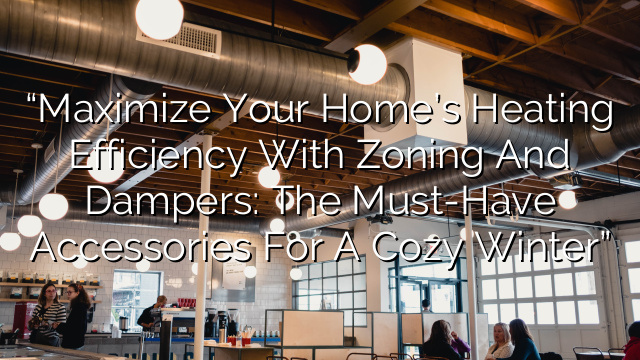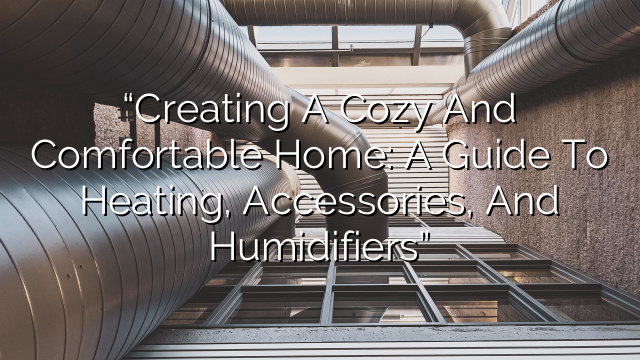Introduction
When the winter season is in full swing, keeping your home warm and cozy becomes a top priority. The key to achieving maximum heating efficiency lies in the proper use of heating accessories, zoning, and dampers. These essential components work together to provide a comfortable living space while ensuring energy is not wasted. In this blog post, we will discuss the benefits of using zoning and dampers, as well as the must-have accessories for a cozy winter.
The Importance of Heating Efficiency
Achieving heating efficiency in your home is crucial for several reasons. First and foremost, it helps reduce energy consumption and utility bills. By optimizing the way your heating system operates, you can maximize comfort while minimizing costs. Additionally, heating efficiency is also an environmentally friendly approach, as it reduces your carbon footprint and conserves natural resources.
Understanding Zoning and Dampers
Zoning and dampers are two interrelated concepts that play a significant role in heating efficiency. Zoning involves dividing your home into distinct areas or zones, each with its thermostat. This allows you to control the temperature separately in different areas, tailoring it to the specific needs of each space. Dampers, on the other hand, are mechanical devices installed within the ductwork. They regulate the airflow by opening or closing sections of the ducts, directing heat to the desired zone.
The Benefits of Zoning
1. Enhanced Comfort
With zoning, you can create personalized comfort zones in different areas of your home. Gone are the days of fighting over the thermostat settings with your family members. Each person can enjoy their preferred temperature, ensuring optimal comfort for all.
2. Energy Savings
Zoning allows you to heat only the areas that are occupied, rather than the entire house. This targeted heating approach significantly reduces energy waste, as you no longer have to heat unused spaces. By reducing energy consumption, you can save money on your heating bills.
3. Longer HVAC System Lifespan
By avoiding overworking your heating system to heat the entire house uniformly, zoning helps prolong the lifespan of your HVAC (heating, ventilation, and air conditioning) system. Since the system only operates when needed, it experiences less wear and tear, leading to fewer breakdowns and repairs.
The Role of Dampers in Zoning
Dampers are a crucial component of a zoned heating system. They allow you to control the airflow and direct the heat to the desired zones. By strategically opening and closing the dampers, you can achieve optimal temperature control and distribute heat efficiently throughout your home. This ensures that each zone receives the right amount of warmth, further enhancing overall heating efficiency.
Must-Have Accessories for a Cozy Winter
In addition to zoning and dampers, certain accessories can further improve your home’s heating efficiency during winter. Here are a few must-have accessories:
- Programmable Thermostats: Investing in programmable thermostats allows you to schedule temperature adjustments throughout the day. You can set the thermostat to lower the temperature when no one is home or during sleeping hours, reducing energy consumption without compromising comfort.
- Ceiling Fans: Although often associated with cooling, ceiling fans can also help distribute warm air throughout the room. By running your ceiling fans in reverse (clockwise), they will push the warm air that rises back down, making the room feel warmer.
- Draught Excluders: These simple accessories can make a big difference in maintaining a warm and cozy home during winter. Draught excluders, also known as draft stoppers, are placed at the bottom of doors and windows to prevent cold air from entering and warm air from escaping.
- Insulation: Proper insulation is key to preventing heat loss in your home. By insulating your walls, attic, and floors, you can maintain a consistent temperature, reduce the workload on your heating system, and save energy.
- Radiant Floor Heating: Radiant floor heating provides a luxurious and energy-efficient way of heating your home. This system uses warm water flowing through pipes under the floor surface to radiate heat upwards, creating an even and comfortable warmth.
FAQs
- Q: Can I install zoning and dampers in my existing HVAC system? A: Yes, zoning and dampers can be retrofitted into existing HVAC systems without major modifications. It is recommended to consult a professional HVAC technician to ensure proper installation and zoning design.
- Q: How does zoning affect the HVAC’s airflow? A: Zoning and dampers help regulate the airflow by diverting it to the zones that require heating. This ensures that each zone receives the desired amount of warm air, improving overall comfort and energy efficiency.
- Q: Will zoning and dampers increase the cost of my HVAC system? A: While there is an initial investment involved in installing zoning and dampers, the long-term energy savings and improved comfort they provide often outweigh the upfront costs. Additionally, the increased efficiency may help prolong the lifespan of your HVAC system, potentially reducing future repair and replacement expenses.
- Q: Are there any maintenance requirements for zoning and dampers? A: Zoning and dampers require regular maintenance to ensure proper functioning. It is important to schedule annual HVAC inspections and maintenance to keep the system running smoothly. Additionally, checking and cleaning the dampers periodically can help prevent any blockages or malfunctions.
- Q: Can I retrofit my current thermostats with programmable ones? A: In many cases, it is possible to replace your existing thermostats with programmable ones. However, compatibility and installation requirements may vary depending on your HVAC system. It is recommended to consult with a professional HVAC technician to determine the best options for your specific setup.














